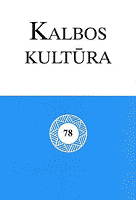Naujausi psicholingvistiniai vaikų kalbos tyrimai
Psycholinguistic research in child language acquisition in Lithuanian
Author(s): Ineta SavickienėSubject(s): Language and Literature Studies
Published by: Lietuvių Kalbos Institutas
Keywords: Child language; psycholinguistics
Summary/Abstract: Different levels of language acquisition constitute a complicated and dynamic process. This could be accounted for by the fact that children are involved in an active interaction with their environment, and in doing so, get access to more relevant information. The increasing amount of information and knowledge involves a qualitative and quantitative modification of the respective data depending on the conditions of the systems. In the process of mastering the adult competences, a child is exposed to transitional phases. An overwhelming majority of child language development research has dealt with the acquisition of English as a first language. Research into other languages started later and was given an impetus by the search of universals in the process of language acquisition. In Lithuania, there has been no systemic research into child language acquisition until recently, when the implementation of new methods and technologies has started (CHILDES). The present paper aims at describing language development of different linguistic levels, at showing when and how a particular grammatical category emerges in the child's speech. Research into child language acquisition has met practical needs as well. It is mostly manifested by the fact that the description of how different linguistic phenomena (pertaining to different language levels) are acquired helps us identify developmental norms in a particular language. The norms, in turn, might help recognise defects occurring in child language.
Journal: Bendrinė kalba (iki 2014 metų – Kalbos kultūra)
- Issue Year: 2005
- Issue No: 78
- Page Range: 231-240
- Page Count: 10
- Language: Lithuanian

